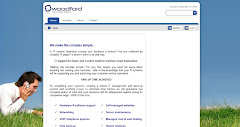
Information is the lifeblood of any company and most of it can be stored on computers. As a company grows however, so does the amount of information, until there is a problem, not with storage, but retrieval. Staff cannot work efficiently if the data they need is held on a number of computers, perhaps housed in different offices or even in separate buildings. E-mailing each other or circulating printed copies of essential information is time-consuming, expensive and can lead to mistakes.
Before your business reaches this stage, it makes sense to consider setting up a Company Intranet.
An intranet works in the same way as an Internet website except that it is only accessible within your company. If you see your public website as a shop window to the world, then an intranet is like a filing cabinet in your private office; an expanding cabinet in which you can arrange all your documents, directories, sales catalogues, financial records, e-books, photos, videos and anything else you need to run your business.
It is quick and easy to set up an intranet. All you need is a web server to host it. If you haven’t the time or expertise to do it yourself, ask a reputable IT support company for help and advice.
Once you and your staff begin to use your company intranet, these are just a few of the benefits you will be able to enjoy:
· Instant updates. As soon as new information is posted it is available to everyone who has access to your intranet.
· No need to print out memos, reports etc. when everyone can access them online. Saves the cost of paper, ink and postage – and helps the environment!
· Content is password protected so you can choose which information is available to all employees and which is restricted.
· No need to buy and license software for each computer – another money saver!
· Individuals and departments can keep in touch with each other and find out what’s happening in the rest of the company through blogs, message boards or regular newsletters.
· If holiday and work rotas are on the intranet there’s no confusion about who is – and is not – available at a particular time. When someone has been away from work, they can quickly catch up on what’s happened during their absence.
· Easier home and distance working. A computer doesn’t have to be on your premises to be connected to your company’s local area network.
· It’s simple to operate and tailor to your needs. You can add or adapt features as your business changes, try out new ideas or discard things you no longer need.
An intranet allows you to work smarter because access to your company’s information is at the finger tips of everyone involved in the business, whether onsite or working remotely. Intranets also save a company money by eliminating the need for printed manuals, and they make staff feel like they are part of a network.















